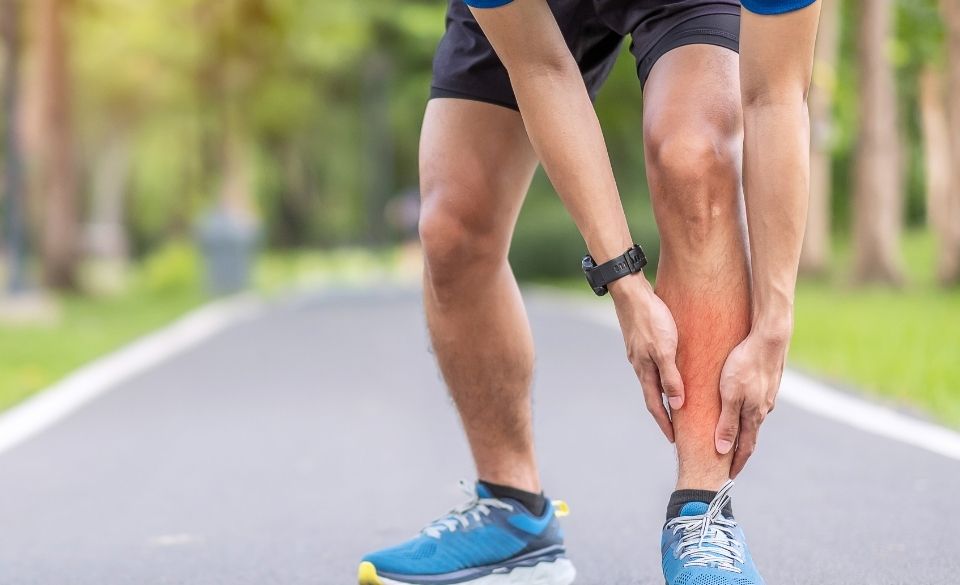
Pain When Running – Is It A Running Injury or training Aches?
Page Contents
Running is one of the best ways to improve health, lose weight and improve your cardiovascular fitness. Many studies have also shown that an individual who runs may live longer and improve their cognitive health in the process.
However, for some people, running regularly can also impact their health. This may mean the more running you do, the more likely you are to cause mild to severe damage to the muscles and joints in the process.
Because of this, it is not uncommon to experience injuries and aches along the way. However, many runners find it hard to differentiate an injury from aches. So, many runners wonder if the pain they experience when running is an injury or just aches from training.
In this article, we help discuss pain when running and if it is an actual injury or just aches and soreness from training. So, keep reading to learn more.
Are Aches And Pains From Running Normal?
Before we start talking about injuries from running, we first must understand if aches and pains from running are normal.
Although running does provide the body with many benefits, the journey of starting and continuing to run does involve some pain and discomfort though.
Most of the time pain and discomfort come from muscle soreness. However, muscle soreness can be a positive sign. It means that your muscles are starting to grow, develop and strengthen from running. However, it can also be a sign that too much stress is being placed on your muscles and joints. This can often lead to aches, pains, and sometimes injuries.
Often injuries are caused by poor running form. Things like discomfort in your back, arms, or neck when running may be a sign that something more serious is going on, and your core is not functioning as well as it could. Alternatively, your running form may rely on more upper body movement that is necessary, causing the upper body to take more load on when running.
Another thing like poor footwear may cause incorrect gait movement, placing more stress on the knees, hips, and lower back, not to mention the arch of your foot and shins.
then last but not least is stretching. Regular stretching is vital to prevent soreness from happening after a run. It can also play a major role in your biomechanics, causing poor running technique.
Alternatively, over training and a rapid increase in training load can all cause injury over time. Running too much, too sore is one of the most common causes of injury, as the body cannot repair itself in time before the next runs.
However, an increase in training load can also cause aches and soreness. Remember those long runs, the day after? Your muscles are fatigued, tired, and sometimes swollen. So, it is not only poor technique, or lack of stretching that can cause aches and soreness in the body.
So, are aches and pain when running normal? Well, yes and no. Often pain when running can be from overexerting yourself on previous runs. It can also be from a lack of recovery or a change in terrain and running surface.
If you are feeling pain when running periodically, you most likely just need to plan better recovery into your training. That is if the pain is coming from sore or fatigued muscles. However, it is important to understand continuing to run with an ache or soreness anywhere in the body can often lead to a mild injury.

How Do You Know If You Have A Running Injury?
To determine if the pain from running you have is an injury, there are a couple of guidelines to follow.
First, does the pain persist? Generally, it is normal to feel a little tight when you start running, especially if you a running a lot during the week. However, if these aches or pain don’t subside, it may be a sign of a mild injury forming.
Alternatively, if it becomes more painful as you run, it is most likely you are already dealing with a mild injury.
You can usually confirm this over the next few days. Does the pain disappear or decline, or does it continue? If the pain continues the next few days, you most likely have developed an injury.
The most common running injuries or pain you experience when running are:
Calf pain – Change in footwear, uphill running, or increase in mileage.
Chest pain – Overexertion
Side pain – Poor core strength or increased intensity
Stomach pain – Eating too close to a run, or cramp from running
Soleus pain – Tight calf muscles or Achilles tendon
Shin pain – Overpronation, change in surface, or increase in volume.
Calf pain – Change in footwear, forefoot running, or increased uphill running.
While these are just some general factors into why you may experience pain when running. However, there are many other causes such as:
– Poor running technique
– Poor flexibility
– Increased training load
– Lack of recovery
– Change in terrain or running surface.
However, some people may experience, elbow pain, neck, and lower back pain when running. Many times this pain will subside the day after running. However, if it lasts longer than a day, you should class it as a mild injury and either reduce your training or rest completely until it subsides.

How Common Are Running Injuries?
Generally, slight aches and pains are normal for people running a lot. Many of these symptoms are from the body adapting to the training and getting stronger.
However, sometimes mild aches and pains can be symptoms of a more serious issue. Which can often lead to some of the most common running injuries, like muscle and joint injuries.
Muscle and joint injuries are common within runners and these can range from short-term discomfort to chronic pain that requires rest.
With these types of injuries, marathoner runners are most like to experience these injuries. Studies have shown that more than half of individuals training for a marathon get injured. While only 27% of novice runners pick up muscle and joint injuries.
However, novice runners are generally more likely to sustain an injury when they first begin.



